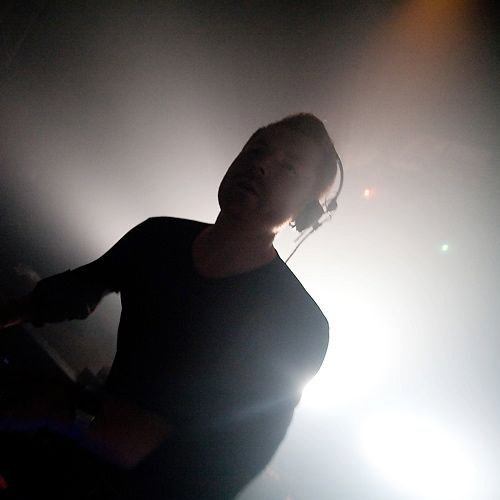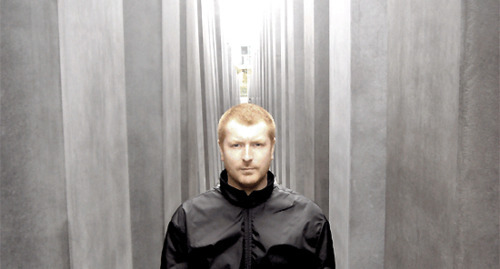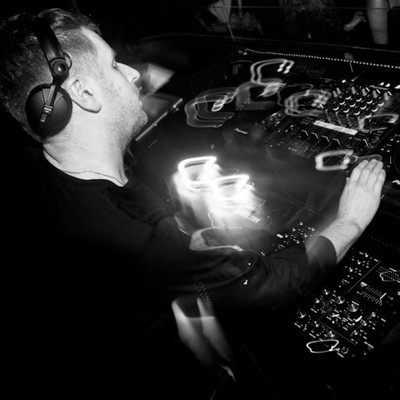
Yes. I played for ten years almost, and then—actually it's a little bit of a funny and a sad thing at the same time—I sold my drum kit to get my first professional monitors, my first Genelecs. I'm in this phase right now where I want to have drums again, so I'm seriously considering buying a drum set again.
 Yeah, I didn't really discover the DJ culture...for me, it was more the production. In my city where I grew up [Schwäbisch Gmünd], there was no nightclub, there was no scene whatsoever. There was a record store and some magazines like Groove or De:Bug that you read, but for me it was really more about trying to be like DJ Shadow, or trying to sound like Nightmares On Wax back then. This hip-hop, sample, abstract beats kind of thing. Imitating the heroes that I had back then.
Yeah, I didn't really discover the DJ culture...for me, it was more the production. In my city where I grew up [Schwäbisch Gmünd], there was no nightclub, there was no scene whatsoever. There was a record store and some magazines like Groove or De:Bug that you read, but for me it was really more about trying to be like DJ Shadow, or trying to sound like Nightmares On Wax back then. This hip-hop, sample, abstract beats kind of thing. Imitating the heroes that I had back then.I had a partner [Joachim Tobias] and we did music together [as Inverse Cinematics], and through a mutual friend we got in contact with a record label from Stuttgart. We just gave them like four or five CDs full of tracks, and from all of those they liked one track and wanted to put it on a compilation. So, actually that was the first release. That was 2000 or 2001 I think.
Shortly after I was super-motivated also because the guys took me to a nightclub. It was the first time I was exposed to DJ culture and how records work, and what makes a record a dance floor record. Before I would always try to fit in as much as possible in one track. But then I realised, "OK, maybe it's good to just strip it down, because that works on the dance floor."
As always with most of my tracks, the work on "Monorail" started afI wanted to discuss your "drum ensemble":
It was a TR-626. It's like a really cheapish ROM kind of thing, but it has the classical—like the 505—Chicago bass drum and claps, so you got the feeling of the 707 for cheap.
And now you have most of the TR series, right?
Yeah, at one point I had them all, but I sold the 808.
Yeah, sure. The 909 is still the mainstay. I mean I sold the 808 because it didn't have MIDI and I couldn't do...like, I used the 909's trigger-out a lot with arpeggios on the Juno, and MIDI—the whole sequencer on the 909—is just the perfect sequencer for any drum machine. So, you can also control other synths with MIDI, and I use that a lot, because you can have the swing of the 909, which is also super-sexy, I think. I also love the 606 for the hi-hats. But yeah, I pretty much try to use all of them and modulate them. Everybody's using a 909 and has been for ages, but there are still ways you can make it sound different.
Put it through a vocoder. Or put it through some compressors. A lot of people wrote to me on Facebook, "How do I make it sound that raw?"—they even have a 909, but they just can't get these really kind of crazy claps or whatever. It's just triggering them through really cheap compressors or even recording it onto tape. There are lots of different things [you can do] to make it sound even more gritty.
There's some I really like, for example, the Drumulator from Emu. It's like a cheap LinnDrum, but it sounds pretty near. So, I use the claps quite often, and then there's this strange little piece of DDR history called Vermona DRM, which is also super funny and sounds very unusual, I think.
In what sort of way?
Would you be layering it with other sounds then?
Yes, actually I still try to find a way to sync everything, so I can just work with all drum machines together. But it's super hard. Schneiders Buero has this Clockwork thing, and I tried that, but even this is not 100% accurate. So, I think it's a dream if everything would just work like I wanted it to.
I wanted to move on and talk about jazz, because I know it's been a huge influence for you. Are you still sampling a lot of jazz records these days?
 I mean with MCDE there are two [methods] (or there used to be). I don't know if I'm gonna carry it on. The Raw Cutsseries is entirely sample-based, only vinyl rips and then straight into Cubase. Then there's the more electronic stuff where I use all the synths and stuff. So, for the more sampled aesthetic, it's still very much dependent on me buying records regularly. I'm still very much into that.
I mean with MCDE there are two [methods] (or there used to be). I don't know if I'm gonna carry it on. The Raw Cutsseries is entirely sample-based, only vinyl rips and then straight into Cubase. Then there's the more electronic stuff where I use all the synths and stuff. So, for the more sampled aesthetic, it's still very much dependent on me buying records regularly. I'm still very much into that.So you're saying with Raw Cuts absolutely everything would have been sampled?
No, I use drum machines on those as well, but no synths. All the musical stuff is completely sampled.
Are you able to name some of the samples you used?
Are you usually looking to sample bar-long sections? Single hits?
In what ways would you manipulate these samples?
One thing that I did very often with the Raw Cuts was just pitching samples completely down or up. As far as an octave or even more, especially with like Fender Rhodes shots, or double: if it's just a single tone, play chords with it—and because it's a sample you have different kind of durations of it when you play it pitched. I don't time-stretch it, I just leave it as it is. You have a nice kind of artifact when you play it.
It sounds like, from the interviews I've read before, that you have a clear feeling—or harmonies—in mind that you're continually looking to achieve.
I'm not a trained pianist. I'm definitely going to at some point take piano lessons. In the future I just want to be able to directly achieve what I have in mind. To this day, it's still very much trial and error. I mean, I know harmonies, I know chords, but I can't play. Like, I can't solo or anything without playing some wrong keys. So what happens is I take half an hour to play the exact notes I want to play, and then I can play, you know? But I'm not very good at improvising.
With chords, it's a different situation. I know pretty much what I want to have, what harmonies, and usually it's a little bit more complex, minor seven, whatever chord. It's not just basic minor/major chords. At the same time, I also go away from all music theories. Like, you have your music scales book next to you, and you just ignore it and press keys that are not supposed to work together, and it can turn out really well. So sometimes it's good to just ignore music knowledge or whatever you want to call it.
Yes, definitely. Not only in aesthetics—I mean, that's my major goal—but also to capture the essence of what made these records sound so special. Meaning, I want to record straight onto tape, I want to have musicians over and just capture everything. I've also been investing in a lot of analogue stuff, or Fender Rhodes pianos, string ensembles, stuff like this. To just be able to, if I wanted to, make a jam session and directly record it onto tape and have that feeling.
Are there things you do in post-production to achieve more of a vintage sound?
The big problem I have is, nowadays, everybody's doing so much "post-everything," you know? Like you only do a MIDI bar and you do everything in Cubase or in the sequencer. There's no direct, raw live energy to it. I much prefer to do something that is definite and you can't touch it anymore. When it comes to post-production in the sense of mixing, compressors and everything, I have to admit that I'm not the best at that. I haven't gone into this much so far, but it's definitely something I want to learn or work with.
Yeah, sure but with the Raw Cuts, it's just a very "blue-eyed" approach and that's what makes part of the magic, I think. Not knowing what it needs to sound completely clean and perfect. Ignoring certain red bars or whatever.
Let's talk about synths a little bit. You said before that the DX7 is your main source for your typical MCDE chord sounds?
Yes, it's still one of my favourite synths, that's for sure. I mean, the thing is, I talked with Floating Points about this recently and we agreed on one thing: now that we tour a lot, you buy a lot of gear but you have very little time to actually use it. So, the DX7 is something you can hear on a lot of records that I did a couple of years ago, or even last year. But by now when I'm in the studio, I have so much more than I'm using that currently it gets a little less love. But it's still, for the price, just an amazing synth. It sounds like nothing else and it's capable of all sorts of stuff. Just by accident you re-create some of the early '80s house sounds and you're like, "Wow, that's what they used."
Did it take some time to figure it out? FM is obviously a different way of doing things.
I mean, I still can't program a patch from scratch. So what I do is edit some of the patches I have. But what I restrict myself to is to not just upload anything from the Internet but really try to work with the few patches that are on there. I mean, once you understand the basics it's not super, super complex. There are a lot of parameters to it, and the interface is really shit, but it's like this with every '80s synth.
What others synths do you lean on heavily?
The thing with me is I always trade stuff, so I don't really have any one constant. The only constant that I could think of as well, would be the Matrix 6 from Oberheim.
Do you find yourself using particular synths for particular parts, though?
 Yes, definitely. Like speaking about Monorail, and a lot of my other basslines, they come from a [Roland] MC-202, which is basically the SH-101 with a sequencer. And the DX7, obviously. And nowadays a lot of the sounds I work with are from a [Sequential Circuits] Prophet VS, which is like a vector synth, with the same filter as the Prophet 5, I think. So it's actually kind of the thing why I don't use the DX7 so much at the moment—this little beast.
Yes, definitely. Like speaking about Monorail, and a lot of my other basslines, they come from a [Roland] MC-202, which is basically the SH-101 with a sequencer. And the DX7, obviously. And nowadays a lot of the sounds I work with are from a [Sequential Circuits] Prophet VS, which is like a vector synth, with the same filter as the Prophet 5, I think. So it's actually kind of the thing why I don't use the DX7 so much at the moment—this little beast.And you also own a Doepfer Modular System: do you have much of a knowledge of modular synthesis?
I don't have that much, but I mean, when you have a Juno and you understand the basic layout of how you connect, or how the VCO works with the VCF, with the VCA and everything, it's the same on your modular. You just need to patch it yourself. So I use it. But the thing with the Doepfer is that it sounds really, really clinically clean. It's a very techno-sounding synth. I definitely use it right now, but nothing I've made with it has been released yet.
Do you think in general modular synths lend themselves to house music?
Yeah, it depends. Usually the people using modulars are more into techno, or more abstract kind of stuff. Also when I go through message boards, or when I buy stuff from people, [you'll see that the] big modular[s] are [owned by] the more scientist kind of producers. And I can understand it, but at the same time, it really takes time to actually come up with something cool with a modular synth, especially if you have a really big system. With the Doepfer it's still limited—it's only got two oscillators and two filters, so it's not super-complex—but with a big system you definitely spend hours and you will never be able to re-create anything, so...
Are you someone who likes to get ideas and sounds down very quickly?
Not necessarily. If I have the comfort of just jamming around, then I'd definitely take the time to test new things and also work a lot with the modular, or with the more complex synths. The DX7 takes a huge amount of time if you really want to program stuff.

If you have a whole day to work in the studio, how might you structure your session?
If there's something I have to do, like a remix or any kind of thing that needs to be done, then I'd rather have a quicker approach to it. Or a more productive approach to it, like starting with a bass drum and then building around it. But if it's something for myself, and I have the time and comfort, then I just also like go to the Fender Rhodes and test harmonies before I do anything with drums. So, it's really a time question.
Usually when I have the chords and the Fender, I then lay them down MIDI-wise, put them on one of my synths, and then try to find a cool sound on the synth. And then just go through the drum machines and see what fits and build up from there. I may also put some samples and go through the sample library, see what fits. There's no real, 100% same approach all the time. I like to jam as well.
How has touring affected your approach?
I decided to not do anything of my own until I have time to really think of how I can push things forward and not just repeat myself. So with the remixes it was the perfect thing, because in one way you are restricted to actually do something—there is already an idea. So you're bound to that idea, and at the same time you can just experiment, because one of your own records is always a statement that's going to be in people's minds.
Were there particular methods or sounds you are keen not to repeat?
Yeah, definitely. I'm not going to do Raw Cuts seven and eight, or nine and ten, or just stick to a cheap formula to generate money or interest. When you do this, you will be forgotten so soon; you're just a one-trick pony.








